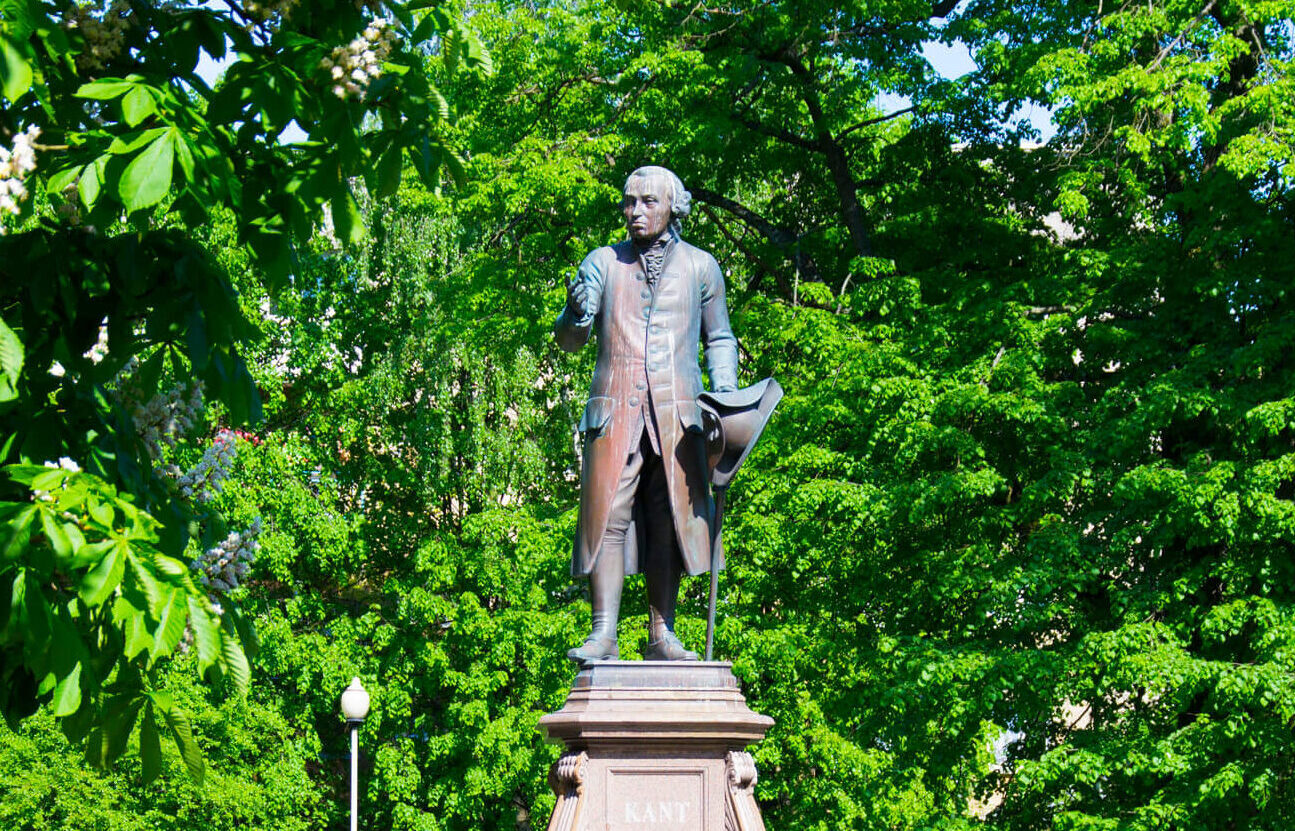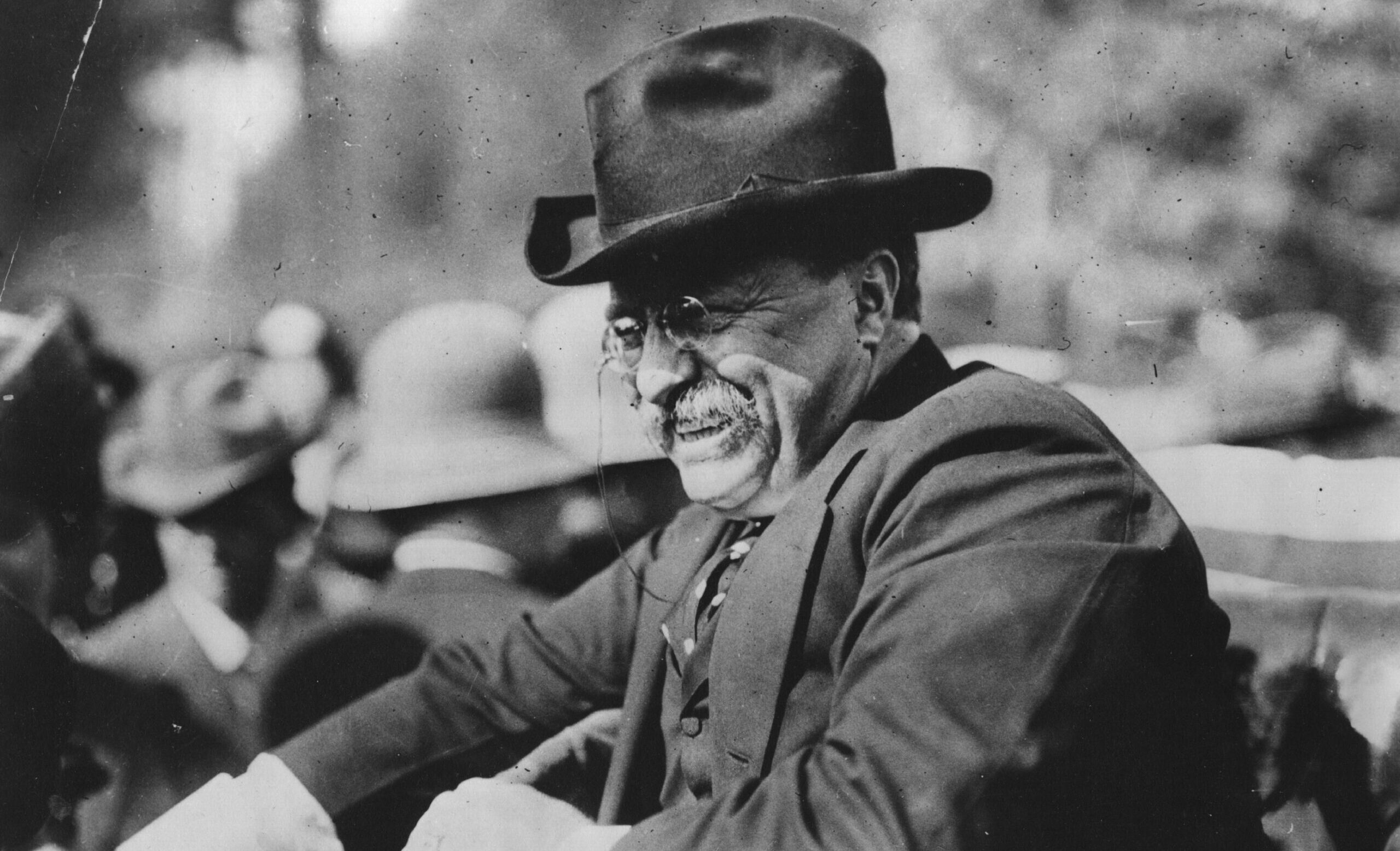How should the most influential philosopher of the modern era in the Western world be remembered?
The tercentenary of the birth of Immanuel Kant (1724–1804) makes the question unavoidable—yet meets with no simple answer. Commemorative events this year and other recent engagements with his legacy range from traditional celebrations of his philosophical writings to sharp disputes about their political implications and unprecedented challenges to the value of his moral philosophy. The latter come in the wake of revisionist scholarship from the last two decades that seeks to reframe key parts of Kant’s corpus in light of his views on race.
This “Year of Kant”—as it is known in Germany—in 2024 is the first major commemoration to occur since the scholarly community began to take notice of Kant’s treatment of race. Even at the time of the Kant celebrations in 2004, on the bicentennial of his death, the topic had barely entered academic conversation. Not until the last dozen years has it grown into an issue that a growing community of scholars has pondered seriously.
The 2004 bicentennial was a full-scale salute hardly different from previous commemorations going back more than a century and a half, each of which was nothing less than reverent, with the only heated dialogues focused on rival expert interpretations of Kant’s (often abstruse) theories. In the first great “Year of Kant” in 1881—the centennial of the Critique of Pure Reason—he was honored by the scholarly organizations of Wilhelmine Germany as follows:
It is not easy to overestimate or to overstate the significance of the publication in 1781 of Kant’s Critique of Pure Reason. It is in no partisan or fanatical spirit that the student of philosophy and of human progress observes the centennial year of 1881 in commemoration of this event, by reviewing the significant changes in human thinking and human institutions—in philosophy and science, in literature and art, in ethics and theology—which may be properly referred to Kant and his great treatise. It is of comparatively little importance what interpretations we give to the leading positions of this memorable work, or what opinions we may hold of their truth or falsehood. . . . We may most fervently and rationally believe that he rendered a service to philosophy, to culture, and to faith which should make him immortal.
Admirers noted that Kant’s magnum opus was fatefully published in July 1781, mere months before the end of the American Revolution and the initial tremors that would climax in the French Revolution by the decade’s close. Kant, too, the scholars pointed out with professional pride, was launching a revolution—and his “Copernican turn,” as he called it, was as pathbreaking in the history of modern thought as that of Copernicus in science. Its effects on epistemology, moral theology, ethics, and a host of other disciplines proved transformative.
Kant announced in the Critique of Pure Reason that he would limit reason “to make room for faith” and deny the possibility of “knowing” the great unknowables—“God, freedom, and immortality”—while formulating the conditions whereby human beings could reliably gain knowledge and behave ethically. This epistemology became known as Kant’s “transcendental philosophy”: an approach for establishing the sources of human knowledge that “transcended” reliance on the evidence of the senses and instead focused on how such sensory data is constructed or filtered by the innate functions of the mind. According to Kant, this critical approach—his thoroughgoing “critique” of reason in its “pure” mental operations—advanced philosophy beyond the empiricism of thinkers such as John Locke and David Hume and beyond rationalists such as Descartes and Leibniz. Like Plato, Kant was an idealist who held that “ideas” existed independently of human minds, but he devised a “critical idealism”—another term commonly attributed to his philosophy—which subjected idealism to a “critique” whereby he concluded that the reality of some ideas (e.g., God, freedom, and immortality) cannot be established by human reason; they are “things in themselves.”
Although Kant saw himself as “making room for faith,” he was indeed denying that human reason could ever rationalize faith, and that religion was necessary (or even helpful) for establishing morality. The Catholic Church interpreted his philosophy as a denial of natural theology and temporarily placed his book on the Index in 1827.
Kant’s approach bore affinities with the thinking of Martin Luther, and he soon became known as “the philosopher of Protestantism.” Friedrich Paulsen, an influential nineteenth-century exponent of Kant’s work and leading member of the philosophical school of Neo-Kantians, wrote that Kant’s moral philosophy was “nothing but the translation of . . . Christianity from the religious language to the language of reflection: in place of God we have pure reason, instead of the ten commandments the moral law [‘practical reason,’ in Kantian terms], and in place of heaven the intelligible world.” Kant’s philosophy may be regarded as both a “free translation” of Luther and, by removing God from morality, a rebellion against his own Lutheran upbringing. Kant had grown up in a devout Prussian family in the German Pietist tradition that honored devotional practice and values such as humility, obedience, respect for authority, and fidelity to scripture.
Kant shaped German and European intellectual history—and modern Western culture—far beyond his time. In middle Europe, his cultural stature is comparable to that of Shakespeare in the Anglophone world. Major continental thinkers of the last half century, such as Germany’s Peter Sloterdijk in the Critique of Cynical Reason (1983) and France’s Michel Foucault in “What Is Enlightenment?” (1984), have sought to extend Kant’s work in new directions. In many quarters he is regarded as the leading thinker of the modern age, indeed the preeminent philosopher since Plato and Aristotle, with the Critique of Pure Reason hailed as the greatest work of philosophy ever written. Enduring debates about his work reflect how significant his ideas have remained in philosophy, art, literature, politics, and society. Intellectual historians credit him with delivering the philosophical masterworks that decisively shifted the West’s focus from dogmatic faith, divine revelation, and political authority to reason, secularism, personal conscience, and the open society. Whereas numerous other early and late Enlightenment thinkers (Descartes, Spinoza, Berkeley, Leibniz, Diderot, and Hegel, to name a few) seem to us definitively figures of “the past”—however important they may remain to students of philosophy—Kant is one of those historical figures whose “pastness” seems merely chronological. A recent cover story in FOCUS, one of Germany’s leading magazines, illustrates the point: “What should we do, Herr Kant?” asked the editors.
That question gains particular force when posed in terms of how Kantian ethics may guide choice-making in our personal lives. As one of many examples of the recent application of Kantian ethics to previously unexamined domains of morality, consider that Kantians such as Harvard’s Christine Korsgaard have devoted book-length reflections to how Kant’s arguments support the case for vegetarianism. Kant’s categorical imperative—a cornerstone maxim of his ethics whereby right action is revealed if we “universalize” a choice and will its practice by all humankind—mandates that we abstain from eating meat, Korsgaard contends in her closely argued Fellow Creatures: Our Obligations to the Other Animals (2018). Her analysis of Kantian moral philosophy in behalf of vegetarianism—which focuses on the fact that 9.5 billion farmed animals die, under horrific conditions of suffering, in the United States annually—shows the pertinence of Kantian ethics to an issue that is nowhere near reaching consensus. (Kant, perhaps failing to see the implications of his own doctrines, was himself an omnivore.)
Such topics will be among those raised in conferences throughout 2024. Alongside the Critique of Pure Reason and other books, talks and panels will address essays such as “What Is Enlightenment?” (1784), in which Kant famously threw down the gauntlet to his readers with his call of “Sapere aude!” (“Dare to Know!”). After a nod to classical antiquity and the Latin poet Horace, who coined the phrase as an incitement to move beyond contemplation and “know” through action (“Sapere aude, incipe”—“Dare to know, begin!”), Kant’s essay proceeded to invest the phrase with a revolutionary force that soon established it as the motto of the Enlightenment.
Kant’s message in “What Is Enlightenment?” was not only pedagogical but also political. He lamented that the vast majority of human beings throughout history have remained “minors” all their lives. Through a combination of cowardice, naïveté, indolence, and submissiveness, they have let others determine their lives for them. “Grow up! Think for yourselves! Come to know yourselves, your potential, and the world! I dare you!”—that was Kant’s message, and within five years its consequences for revolutionary action would shake the world, as philosophy took to the streets of Paris and Jacobin furor raged. (Kant greeted the French Revolution as a welcome rebellion against paternalism and unjust authority, though he came to believe before his death that its noble ends had been compromised by its ruthless means.)
This year, in addition to smaller symposia throughout Germany, Immanuel Kant Baltic Federal University in the Russian exclave of Kaliningrad (where Kant was born when it was part of East Prussia and known as Königsberg) is assembling an International Kant Congress to address “The World Concept of Philosophy.” The organizers are not planning an abstract consideration of theoretical matters but rather “what necessarily interests every person”; the conference’s title is a phrase, drawn from the Critique of Pure Reason, meant to convey the reach of Kant’s philosophy into all areas of human thought and conduct. In the nearby German city of Lüneberg, the state museum opened a permanent exhibition, “Kant as Global Thinker,” in April.
Overshadowing such commemorations in and near Kant’s birthplace was the keynote speech at a political science conference in February. The governor of Kaliningrad, Anton Alikhanov, opened up a cultural front with the West on the third anniversary of the start of the war in Ukraine. “One of the intellectual creators of the modern West has a direct link,” said the governor, “to the military conflict in Ukraine”: the city’s most famous son, Immanuel Kant. The philosopher’s moral relativism, the governor said, has inspired “the global chaos and the global realignment that we are now facing.” Kant’s philosophy has served as the intellectual justification for the West’s betrayals of ethical principles in international affairs and its intention to “violate all agreements that have been reached.” German media mocked Alikhanov for having “identified an unexpected contributor” to the Ukraine war and reinvented “the philosopher of Königsberg” as a warmonger. Handpicked by President Vladimir Putin to administer Kaliningrad at the age of thirty in 2017, Alikhanov was at that time the youngest governor of Russia and is a staunch supporter of Putin’s policies and of the Russian army’s invasion of Ukraine.
Such crude attempts to politicize Kant have rarely characterized the historiography of Kant studies. Even on the sesquicentennial of Kant’s death in 1954, with the Cold War at its height and a divided Germany a battleground in the conflict between capitalism and communism, efforts to politicize Kant were largely restricted to interpretive exegeses of his work by rival philosophical camps. Even as Westerners exalted Kant as the intrepid pathfinder of personal liberty, East German scholars sought to claim him as an “enlightened bourgeois” forerunner of socialist philosophy. He was dubbed the “grandfather” of Marxism-Leninism—after all, his critiques had influenced the dialectical idealistic philosophy of Hegel, and Hegel was the father figure whom Marx had turned on his head to discover dialectical materialism.
As recently as the bicentennial of his death two decades ago, Kant was gratefully hailed throughout the academic world, and beyond. Political figures across Europe honored Kant’s legacy. Joschka Fischer, the foreign minister of Germany, praised him as “the foremost thinker of the modern age” and made a pilgrimage to Kant’s grave. “I have read all his important works,” Fischer announced—and proceeded to discourse on Kantian classics ranging from his “Essay on Perpetual Peace” (and its impact on “the spirit of global governance,” including the founding of the United Nations) to his nine-hundred-page Critique of Practical Reason and its contribution to contemporary conceptions of moral law, human rights, and the ethical foundations of collective action.
Russian and Lithuanian leaders also converged on Kaliningrad to rename its seven-hundred-year-old university—the erstwhile Albertus University of Königsberg, where the philosopher taught for half a century—“Immanuel Kant University” (later again renamed the aforementioned Immanuel Kant Baltic Federal University). Some Western-oriented voices in Kaliningrad advocate that the city itself be re-christened “Kantgrad,” noting that few Russians have any idea why it bears its current name or who Mikhail Kalinin was. (He served as the honorary president of the Soviet Union from 1919 to 1946, but he wielded no power and little influence.)
One instance in which Kant’s work did get entangled in public controversy occurred exactly a century ago, during the bicentennial of his birth in 1924. Kant’s moral philosophy (with its allegiance to “duty”) was freighted by some Anglo-American voices—most famously John Dewey—with bearing partial responsibility for the jingoistic German nationalism that eventuated in World War I. Dewey, one of the founders of philosophical pragmatism, branded Kant “the thinker who for the past seventy-five years supplied the bible of German thought.” Yet Dewey’s analysis focused chiefly on Kant’s nineteenth-century successors (such as Fichte, Hegel, the imperialist historian Heinrich von Treitschke, and the Neo-Kantians), not Kant himself. For this reason, allegations of Kant’s liability for the war proved ephemeral and remained circumscribed to philosophical circles.
The present “Year of Kant,” however, promises to be different. As he turns three hundred, a Copernican turn in Kant’s reputation may be on the horizon, one that could eclipse his standing as “the father of the Enlightenment” as he becomes a revisionist case study and possible candidate for quasi-cancellation. In the last two decades, the philosopher’s relatively little-known anthropology of race has come to dominate Kant studies in some circles, especially in Germany and the U.S., and it is now emerging into full public view for the first time.
Kant theorized a hierarchy of race in the 1770s that consisted of four levels of development, headed by white Europeans such as himself. These were not merely some personal remarks voiced in passing but rather a systematic theory of race and ethnicity. “Humanity exists in its greatest perfection in the white race,” he wrote, while “the yellow Indians have lesser talents, [t]he Negroes are much lower, and the lowest is part of the American races [Native Americans].” Elsewhere he argued “the [Native] American people acquires no education and cultivated learning [Bildung]” and “has no incentives” to “mature intellectually,” while, he said, Negroes are destined always to be a slave culture because they are driven by impulse and emotion rather than reason.
Such retrograde language from Kant strikes the contemporary reader with the force of a sudden shock. Readers understandably ask: is this the same Kant who rhapsodized in the Critique of Pure Reason, “Two things fill the mind with admiration and respect; these two things remain ever new and increase the more repeatedly and persistently our reflections are occupied with them: the starry sky above me and the moral law within me”?
(The Starry Sky Above Me: A Conversation About Kant is the title of an admiring book-length dialogue about Kant published last year by Daniel Kehlmann and Omri Boehm. It does not address the racial issue.)
And so, while the “Year of Kant” witnesses numerous special events that spotlight his contributions on topics ranging from the pursuit of world peace to the criteria for morality, educators and intellectuals are also pondering how much weight to accord his decidedly unenlightened (though not untypical for his time) views on race. At the University of Jena, researchers are exploring Kant’s remarks on black people and the supposed inherent “villainy” of Jews, seeking to evaluate this aspect of his thinking in the context of statements by other philosophers and writers of the period, as well as in the tradition of Western philosophy. The object of this research is “how we should deal with his legacy,” explained Andrea Esser, the German scholar spearheading the Jena project.
Among the questions these scholars seek to understand are the following: Was Kant a man of his time who largely reflected the thinking of his colleagues, or was he rather an extreme doctrinaire proponent of race ideology? How deeply is the concept of race embedded in Kant’s oeuvre? And how important is Kant’s anthropology for his metaphysics and ethics? Does Kant’s oeuvre actually oppose rather than support equal rights when it comes to racial difference?
As scholarly articles by specialists on Kant’s racial anthropology have multiplied, two opposing camps have emerged. One views his writing on race as a unified whole, from his earliest reflections in the 1760s through the series of lectures that form his Anthropology from a Pragmatic Point of View (1798) and random scattered comments of later years. These scholars also hold that Kant’s racial outlook bears on his moral theory and undermines its pretense to universalism and fidelity to “the moral law within me.” To them, Kant’s adoption of the prejudices of his time quite possibly infects his critical philosophy as a whole.
A second group of Kant scholars, however, contends that one must distinguish between the “early” Kant of the 1760s and 1770s—the so-called “pre-critical” Kant—and the fully mature thinking of the Kant of the 1780s and later, when all his major work appeared, starting with the Critique of Pure Reason in 1781 when he was fifty-seven. These scholars argue that acknowledgment of the two Kants allows one to see that Kant never revisited his racial hierarchy or developed its categories further. This group emphasizes that most of Kant’s racial and anti-Jewish remarks were made before his masterpieces on ethics and morality in the 1780s. By the 1790s, when the Metaphysics of Morals appeared, he had “second thoughts” on race, in the phrase of Pauline Kleingeld, as his admiration for cosmopolitanism would imply. From the standpoint of Kant defenders such as Kleingeld and Sankar Muthu, the philosopher abandoned his earlier views on race and ethnicity by his mid-sixties and his major work does not reflect it.
The problematic fact, however, is that Kant never explicitly disavowed his racial theories. Moreover, racist and anti-Semitic remarks surface in a few items of correspondence from his sixties and seventies, though they are absent from the philosophical works.
Kant’s defenders hold that one can value Kant’s philosophy while deploring his racist remarks, which they regard as marginal or even trivial in the context of sixty volumes of his Complete Works, much of which is available only in German. Whereas his defenders treat the absence of racial prejudice in his mature philosophical writings as evidence that his “transcendental” philosophy also “transcended” those categories, though, his critics say that “silence connotes consent.” Distinctions between an “early” and “late” Kant, they hold, are evasion tactics: if he never returned to the subject of race and never explicitly repudiated his earlier treatises or personal opinions, it was not because he “outgrew” them but because he never changed them.
A few black scholars have proposed a radical revision of Kant’s political theory. Known as BRK (Black Radical Kantianism), it would repair the “structural racism” purportedly at the heart of his political philosophy by incorporating into it selected features of the work of black thinkers such as W. E. B. Du Bois and James Baldwin. For the most part, these scholars are not Kant specialists but were drawn to Kant by reports of his racial anthropology, and their writing about him focuses exclusively on race. The value of their work is discounted by some defenders of Kant because they are not usually versed in the Kant scholarship published in German. The fact that race is much more a topic in American public discourse than in the German academy partly accounts for its delayed rise to prominence in Kant scholarship: most work on Kant is conducted by scholars in German studies. Some of Kant’s prosecutorial critics take a dimmer view of the delay, however. They attribute it to the “hegemonic” structure of the mainstream scholars who allegedly “resist engagement” with his racism as potentially lethal to his reputation. (As an indication of the scholarly and public inattention to the topic, race is still unmentioned in the current entries on Kant in the Encyclopedia Britannica, the Stanford Encyclopedia of Philosophy, and the Internet Encyclopedia of Philosophy, among other reference works.)
While the threat to Kant’s public reputation is certainly real, most defenders of Kant are not worried that he will be “canceled” outright—he is too mammoth a figure for that to happen. Rather, they fear that, if (or when?) the “woke” American media starts bandying about explosive Kant quotations on race, a symbolic asterisk may quickly be affixed to his name: “Immanuel Kant: Racist.”
So it goes. Even as the world recognizes Kant’s stature as a giant of world philosophy, his ongoing relevance means his work is being reexamined according to contemporary values. The father of the philosophical “critique” is undergoing the kind of exacting criticism that he applied to the faculties of reason and judgment in the Critique of Pure Reason and the Critique of Practical Reason in the 1780s and the Critique of Judgment in 1790. If the revisionist trend continues, it is conceivable that Immanuel Kant will come to be seen by students in the future not as the father of the Enlightenment but as the progenitor of racism.














